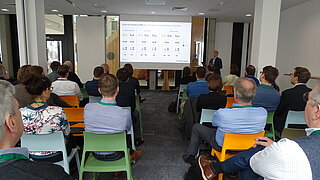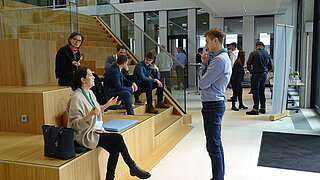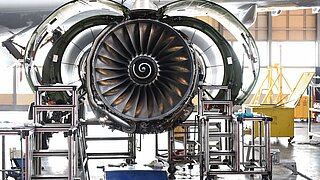Kick-start for an ambitious Sustainability Standard for synthetic Jet Fuel
Copyright: ZUG gGmbH
In a workshop with 40 experts on March 15, the PtX Lab Lausitz worked on the basic framework for CO2-neutral aviation fuels.
Large quantities of synthetic kerosene will be needed worldwide as a substitute for conventional aviation fuels if aviation's CO2 emissions are to be reduced to zero in the coming years and decades. In order for the necessary market ramp-up for CO2-neutral e-kerosene to succeed, ambitious standards are also needed to regulate and control the product requirements. The team of the PtX Lab Lausitz addressed this important goal on March 15th in an expert workshop in the Berlin premises of the ZUG. Around 40 participants from business, NGOs and public institutions came together between 9:00 a.m. and 5:00 p.m.
Setting impulses in lectures and working groups
The workshop consisted of two essential parts: In the morning, the focus was initially on presentations that laid a common professional basis. In addition to speakers from the PtX Lab Lausitz, experts from Lufthansa and the Roundtable on Sustainable Biomaterials (RSB) as well as from the TU Hamburg and the Institute for Energy and Environmental Research Heidelberg (ifeu) also had their say.
Afterwards, two working groups were formed to discuss questions relating to the so-called power-to-liquid (PtL) process in more detail. Among other topics, sustainability criteria and standards, the design of marketplaces and the necessary certification for sustainable e-kerosene were discussed. A central question was: How can PtL fuels with ambitious sustainability criteria be successful in the market, even though they are more expensive to produce and their properties are difficult to control?

Copyright: ZUG gGmbH
Consistent legal framework and standards urgently needed
Aviation is just at the beginning of the introduction phase regarding the production and use of PtL fuels. Numerous regulatory aspects, areas of application and questions about the hydrogen derivatives actually to be used as well as funding aspects are still very unclear. There was consensus among the participants that long-term planning security for investments and a consistent legal framework are required for the rapid market ramp-up of PtL kerosene. In addition, uniform standards should ideally have to be rolled out worldwide.
Content-related discussions and networking
In order to reconcile the market ramp-up of PtL kerosene with the highest standards of sustainability, it is essential to bring togehter the perspectives of different stakeholder groups. The workshop aimed to achieve this and to provide an overview as broad as possible of the different socio-economic elements that are necessary for a successful introduction of PtL kerosene.
The on-site meeting in the Berlin premises of ZUG offered the opportunity to network and to deepen difficult topics in individual discussions or small groups. The workshop participants included representatives of the fuel industry, non-governmental organizations, governmental organizations, the aviation sector and scientists.

Copyright: ZUG gGmbH
Documents
- PtX Lab Lausitz_Anita Demuth_Sustainability criteria for the use of PtL in aviation (German) (2 MB, PDF)
- ifeu_Horst Fehrenbach_Sustainability standards and criteria for PtL kerosene (German) (1 MB, PDF)
- RSB_Elena Schmidt_Certification and creditability of ambitious PtL sustainability standards (4 MB, PDF)
- Lufthansa_Jan Pechstein_Chain of Custody for SAF (757 KB, PDF)
- TU HH_Nils Bullerdiek_Marketplaces (German) (1 MB, PDF)
- Development_of_PtX_Sustainabilty_Standards_and_Indicators.pdf (2 MB, PDF)


